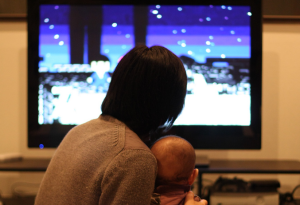Many parents I see are quite proud of how little they let children watch television, even if they are fully accepting (and even encouraging) of their children’s use of more interactive digital media. While some research does show that the interactivity of new media like video games and the Internet make them the better and more stimulating choice for kids, parents should not ignore the positive potential inherent in plain-old television, as well. But parents should think about TV and kids.
First of all, I want to restate what I believe as the father of three boys and as a child psychologist: all digital media, including television, can offer great opportunities for learning, but only when used as one part of a healthy Play Diet. Too much or too little of any type of play is never a good a thing. Also, not everything your child does needs to be about learning. It is perfectly okay for kids to simply have fun watching SpongeBob or playing Little Big Planet. Most of the parents who read this blog, if they’re anything like me, have “wasted” plenty of time watching TV and playing games over the course of their lives, and few (if any) have suffered any negative consequences from it.
Regarding television, I personally have found that the incredible array of content on cable TV has enriched my life, the lives of my kids, and the health of my patients, far more than it has harmed it . Actively watching together with my kids, discussing the content , is a form of joint media engagement, and an opportunity for learning and connections. My youngest son, Ethan, and I often enjoy watching TV shows on the history channel together, typically engaging in some type discussion about the content. My connection with my middle son Seth, is deeply enhanced when watching a basketball game together and talking about our opinions on the best players in the NBA or college ball. My oldest son Scott, and I share a passion for the New England Patriots and he sometimes makes a 90 min. drive on a Sunday afternoon just to watch the game together. If you notice, the common theme here is in going beyond watching the television and making it into an interactive experience with others.
This can be particularly powerful for youngsters with learning and attentional issues, or those who have difficulty in developing a passion or interest. Parents can use television programming about subjects as diverse as dinosaurs, automobiles, history, engineering, or space to engage the child in a learning experience. The key is to go beyond the TV. Watch the program with your child, talk to them about what you’ve seen, go get some books in the library and read them together, go online together to research it more, or go to a museum or to an auto show learn more. You might be shocked by the type of television programming that attracts your child’s interest. Recently, I have had a spate of young children at my office who love television cooking shows and have become active participants in preparing meals for their families, all spurred by watching these TV shows.
Not everything about television is so great, however. Parents need to monitor the amount of time that their kids watch television, as the sedentary inactivity of television can have many negative effects, including an increased risk of poor health and obesity. Remaining inactive for extended periods of time is an insalubrious habit and should be a major concern for parents monitoring their kids’ TV usage.
This is particularly true for younger children. In general, I agree with the American Academy of Pediatricians recommendations that children under the age of two not watch television, and that preschoolers be strictly limited in their television viewing. For those of you who want to know more about television in your children I recommend two books: The Elephant in the Living Room by Dimitri Christakis, MD. and Frederick Zimmerman, Ph.D. and Into the Minds of Babes by Lisa Guernsey.





